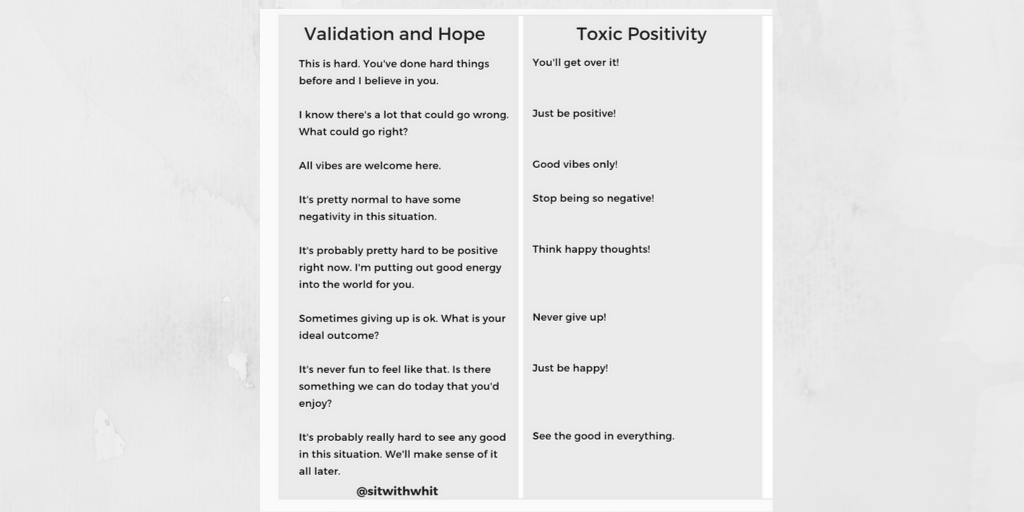Have you ever had an idea in your head that you didn’t know you had?
“Toxic positivity” was one of those concepts I never had language for — that is, until I saw this meme (below) by Whitney Goodman posted on Instagram. Pointing out the harm caused by overriding negativity with happy talk must have struck a nerve with many as this meme has received more than 22,000 likes and been shared all over the web.
This month, I’d like to examine the idea of toxic positivity, briefly touch upon where it comes from and its appeal for some people, and then offer some alternative strategies.

Via @sitwithwhit on Insta
The Power of Positive Thinking Is Real…
There is a large body of scientific literature pointing to the benefits of a positive attitude. By anticipating happiness, health and success, we can train our minds away from anxiety and gloom and towards a worldview of abundance and gratitude.
Many religious traditions also stress positive thinking, often in the form of prayer, acknowledgement of the divine or the belief that everything happens for a reason. Perhaps the most succinct argument for positive thinking comes from The Dalai Lama, who says: “Choose to be optimistic. It feels better.”
…but Has Limits
Positivity can break down and become poisonous when it comes at the cost of pushing away what we authentically feel.
Terrible things do happen in life. Trying to paper over that fact and avoid the inevitable emotional fallout can do real damage to our psyches. When an objectively bad or sad thing happens and we force ourselves not to react to it, it can affect our blood pressure, sleep patterns, memory and digestion. We might shut down, use drugs, alcohol or screens to check out, or ruminate mentally.
Why Toxic Positivity?
People engage in toxic positivity for different reasons. As I mentioned above, some spiritual teachings hammer home the message that negative thoughts should be avoided at all costs. Others genuinely fear negativity as having the power to cause disease or mental illness. And then there are folks who simply don’t have the emotional bandwidth to cope with other people’s pain. That can be disappointing, especially coming from a best friend or a parent. Rather than confrontation or blame, it’s better to simply acknowledge that some people just can’t be there for you in the way you want. I encourage you to seek out the emotional support you crave elsewhere instead.
Let’s look at ways to give and ask for non-toxic support.
Alternatives to Toxic Positivity
When something dreadful happens, what most people need is to feel:
— heard
— validated
— empathized with
— encouraged
When someone comes to you for support, I encourage you to walk through these steps together, to the best of your ability and the capacity of the other person. Be aware that this is just a rough guideline, and the order might vary.
— Listen first. Let them get the whole story out however they need to tell it. Simply being present with another person’s pain without trying to fix or move past it is powerful medicine.
— Validate their emotions by letting them know whatever they’re feeling is okay. There’s never any reason to feel any shame or embarrassment for strong emotions because that’s just part of being human. A gentle reminder that that no feeling lasts forever can sometimes be helpful.
— To the extent that you’re able to relate to what they’re going through, let them know that they aren’t alone.
— Save encouragement for last, and try not to rush to it, if possible. Folks often need to go through the journey of feeling their grief, pain, and despair all the way, before arriving at the other side by looking for solutions or silver linings.
Likewise, I encourage you to ask for what you need from your support network. People can’t read minds! A main reason why folks lean on toxic positivity clichés is because they don’t know what to say, they just want the other person to feel better right away. Don’t be afraid to use to following phrases to get the support you deserve:
— “The best thing you could do for me in this moment is just listen.”
— “I’m really overwhelmed, and it would help if you could just be here with me right now.”
— “Maybe you haven’t ever had this exact thing happen to you, but can you see where I’m coming from?”
— “I’m having a hard time seeing how anything good comes out of this. If you have a different perspective, I’d love to hear it.”
The urge to always look on the bright side may stem from good intentions, but the impact can truly be detrimental. I encourage you to find ways to give — and ask for — support that allows you to experience your full humanity.
Until next time, be sweet to yourself.
Lola D.
—
Lola Davina is a longtime veteran of the sex industry and author of Thriving in Sex Work: Sex Work and Money, her followup to the formative Thriving in Sex Work: Heartfelt Advice for Staying Sane in the Sex Industry. You can get the audio version of Sex Work and Money via Awesound here. Contact Davina at Lola.Davina@ynotcam.com and visit her on Twitter at @Lola_Davina.
Image of Lola Davina courtesy Pat Mazzera.










[…] it is perfectly acceptable for certain tragedies to never feel right. I’ve written before about toxic positivity and the damage it can do to our authentic selves to paper over our pain in an attempt to only […]